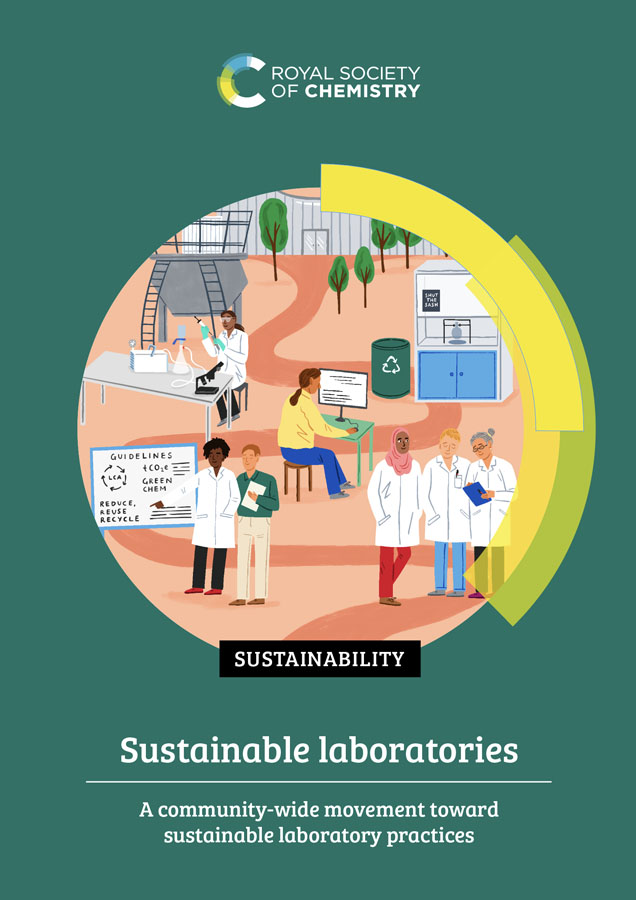Our Sustainable laboratories report
In our report, we uncover what chemists are already doing to reduce the environmental footprint of their research, while at the same time continuing to deliver the ground-breaking discoveries and innovation that make the world a better place. We also share the barriers and trade-offs they face in making sustainability-related changes, and the many opportunities for collaboration and other positive action.
Explore more about sustainable labs
Resources
Discover resources for making your own lab more sustainable, including networks, frameworks, guidance & tools, opinion pieces from the community, and relevant journal articles.
Case studies
Read in-depth case studies from those who have made changes towards making their own lab settings more sustainable.
Sustainable labs grant
Apply for up to £10,000 to help make your research activities more sustainable.
Minimising the environmental footprint of research
How can we carry out scientific research in an environmentally sustainable way, while ensuring research safety, quality and impact?
We invited members of the chemical sciences community to share their views and experiences on this topic. Their responses form the basis of our new Sustainable laboratories report, and will inform our ongoing efforts to support the community in their efforts towards creating greener labs.
Why is this work important?
Science and technology are key to a more sustainable future – in everything from tackling disease to developing new technologies for clean energy generation.
Laboratories – found in universities, research institutes, hospitals and companies – are essential to research, analysis and teaching. They often bring together several disciplines and involve different configurations and scales of wet, dry and computational facilities.
However, laboratory buildings, processes and equipment, by their nature, can be resource and energy intensive. Safely carrying out high-quality research can require temperature control, ventilation or high sterility. And the sourcing, manufacture and disposal of specialised laboratory consumables and instruments also have an environmental footprint.
The key findings
More than 670 scientists in 70 countries participated in an online survey between December 2021 and January 2022. Their feedback, including more than 2,000 free-text responses, gives us individual perspectives on sustainable practices from within academia and industry. Along with desk research, we also gathered views from the community, including our subject community councils and their working groups, and our Science and Innovation Leadership Forum.
Scientists are taking steps to reduce research's environmental footprint
There is a huge appetite on the part of researchers to minimise the effects of their day-to-day scientific work on the environment, and the majority are already trying to do so:
- 79% agreed they know how their actions impact the environment
- 84% agreed they would like to do more to reduce the impact of their day-to-day scientific work on the environment
- 63% have made changes in the last two years to reduce the environmental impact of their research activities, or those of their research group, team or department
See our report highlights or read the full report to see more of our findings, including what scientists are doing already, the barriers and challenges, and what needs to happen next.
Our action plan
The Sustainable laboratories report is part of our long-term plan to help our community on its journey to sustainable labs.
We believe chemists can lead the way to embed sustainable practices across a range of disciplines. However, positive change will require the entire community to work together towards this goal.
We will be supporting the community with a programme of initiatives over the long term, and, as our initial contribution to these aims, we have committed to the following seven-point action plan:
Recognise and reward
We will celebrate and incentivise actions and initiatives driving change towards more sustainable labs – through our prizes and wider recognition programmes.
We have updated the attributes an applicant needs to evidence for our Chartered Chemist (CChem) award to include "Explain how you contribute to a sustainable future".
Provide resources
By maintaining a collection of resources and tools from a wide range of experts and sources, we will empower our communities to implement good practice and make informed decisions for their own research activities.
Establish global networks
We commit to supporting our communities to share practice and knowledge, and we will create and enable networks and fora to enable practitioners to progress on their sustainability journey and support one another.
Convene partnerships
We will harness the diverse expertise and experience of other organisations to build effective partnerships and collaborations including gathering data, establishing guidelines, and supporting the changes needed to move towards more environmentally sustainable laboratories.
Advocate for change
We will continue to advocate for the needs of our science and our community, using our voice to influence funders, policymakers, publishers, educators and beyond, to the benefit of society.
Fund sustainable laboratories initiatives
We will expand our existing programme that awards enabling grants to researchers to include support for initiatives that make research more sustainable.
Embed sustainability in degree courses
We will continue to engage with industry, academia and other sectors to establish criteria for university chemistry degree accreditation that recognise the importance of embedding sustainability in degree courses.
Related pages
- How can we make paint more sustainable?
- A task force of industry leaders are working with us to make polymers in liquid formulations more sustainable
- More sustainable plastics are within our grasp, but more research is needed - read our report
- Our policy on the circular economy of precious metals
- Chemistry can help the composites sector move towards more sustainable practices
- Listen to our award winning podcasts covering many aspects of sustainability
- Our other environmental and sustainability work
- See all our policies, reports, evidence and campaigns
Themed journal collection: Sustainable laboratories
This collection of research showcases from our journals some of the innovative approaches to reduce the environmental impact of research, from solvent selection guides to machine learning approaches and more.


